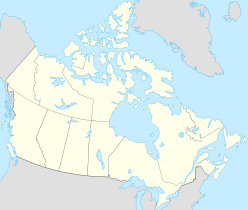Montagnais crater facts for kids
| Impact crater/structure | |
|---|---|
| Confidence | Confirmed |
| Diameter | 45 km (28 mi) |
| Age | 50.50 ± 0.76 Ma Eocene |
| Exposed | No |
| Drilled | Yes |
| Location | |
| Coordinates | 42°53′N 64°13′W / 42.883°N 64.217°W |
| Country | Canada |
| State | Nova Scotia |
The Montagnais crater is a huge bowl-shaped hole found deep under the sea. It was made when a space rock, called a meteorite, crashed into the Earth a very long time ago.
This amazing crater is located off the coast of Nova Scotia, a province in Canada. It's completely hidden beneath the ocean floor.
Contents
What is the Montagnais Crater?
The Montagnais crater is an impact crater. This means it was formed by something hitting the Earth at high speed. In this case, it was a large meteorite.
The crater is about 45 kilometers (28 miles) wide. That's like the distance you might travel to another town!
How Old is This Crater?
Scientists believe the Montagnais crater is very old. It formed about 50.5 million years ago. This time period is known as the Eocene epoch.
During the Eocene, Earth's climate was much warmer than it is today. Many new types of mammals were starting to appear.
Where is the Montagnais Crater Located?
This crater is found on the continental shelf south of Nova Scotia, Canada. The continental shelf is the edge of a continent that is under the ocean. It's like a shallow underwater ledge before the deep ocean begins.
Because it's under the sea, the crater is covered by many layers of sand and mud. These layers are called marine sediments.
How Do We Know About It?
Since the crater is hidden under the ocean, we can't see it directly. Scientists use special tools and techniques to find and study it.
They use sound waves to map the ocean floor and see what's buried beneath. They have also drilled into the seabed to collect samples. These samples help them understand the crater's structure and age.
Studying craters like Montagnais helps us learn more about Earth's history. It also teaches us about the kinds of space objects that have hit our planet.


